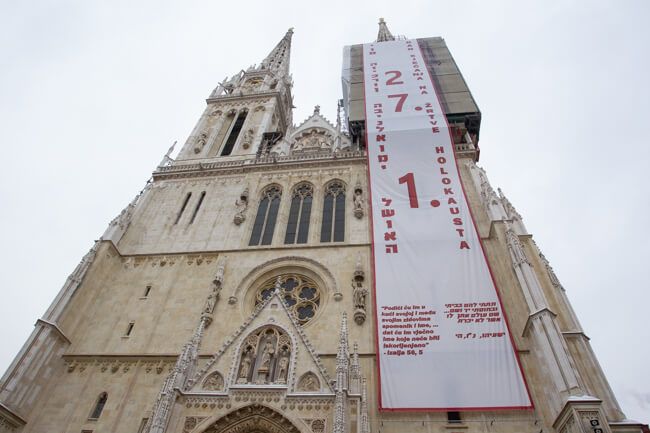On the occasion of the International Day of Remembrance of Holocaust Victims, a prayer-commemorative gathering was organised by the Zagreb Archdiocese and the Hatikva Jewish Information and Educational Centre in front of the Zagreb Cathedral. The event was attended by the Archbishop of Zagreb Cardinal, Josip Bozanić, reports HRT on January 26, 2019.
“The memories in Judaism and Christianity connect the past and the present because, while we remember the victims of inhumane treatment and the attempt to destroy the Jewish people, we encounter the secret of evil, but we are not looking at it only in the framework of the past, but we are aware of it in the present as well,” emphasized Cardinal Bozanić.
“The ideology of racism, directed against God and man, was born in the falsehoods about the man and the Jewish people, spread by hatred, and turned into an inexpressible measure of suffering, which neither words nor images can express,” added Bozanić.

Bozanić also recalled the suffering of the Jewish community in Croatia. “We need to pay special attention to what has happened in our midst, in Croatia, emphasising without any reservation the truth about the horrors of Jasenovac and other camps, where innocent people suffered. Now, 74 years after the end of the Second World War, we also remember the great suffering of the Croatian Jewish community, especially the Jews in Zagreb, which are deeply woven into the life of our city. Of 11,000 Jews, less than 2,000 survived.
He added that it is entirely unacceptable to allow any form of anti-Semitism to be awoken today, although such ideologies exist even now. “They are growing based on the untruths with devastating results of the conflict, intolerance and hate, with the consequences of suffering not just for individuals and certain groups but also the entire peoples.”
The Centre leader Julija Koš said that the rabbi was not present in Zagreb and that she was there as his representative. She read a song saying that each Holocaust victim has his or her name because for the Jewish people the name of the person is the identity, which can be brought back by our memory. “Today’s event is so important that its meaning cannot yet be comprehended. Each sentence of the Cardinal’s address contains a message what we need to do to heal the society, and messages for future generations that will be more similar to other young Europeans,” said Koš. “Teachers and parents will see where we have lost 25 years of upbringing for good and where we let many forces lead the youth towards the evil that has passed a long time ago,” she said.
Some of the descendants of the perpetrators are aware of the truth, some are not, but none of them are guilty, she said, adding that in other European countries more descendants are aware, while there is a small part of those who advocate for their forefathers who committed the crimes. “In Croatia, we have a small percentage of these, but they are sometimes very loud,” added Koš.
Answering the question about the Catholic Church providing venues for the promotion of books that deny the Holocaust, Kristijan Lepešić said that this event had marginalized them. “The most important thing is that this is the largest such event we have seen in Europe. This is a major step forward for the Catholic Church not just in Croatia, because Cardinal Bozanić is a member of the Roman Curia, and I think this is the best way to marginalise the forces that promote such books,” said Kristijan Lepešić.
The event was attended by ministers Marija Pejčinović Burić and Nina Obuljen Koržinek, as well as Zagreb Mayor Milan Bandić and Speaker of Parliament Gordan Jandroković.
The International Holocaust Remembrance Day is marked on January 27, in memory of the day in 1945 when the Soviet Red Army liberated the largest and the most notorious Nazi death camp in Auschwitz, where more than a million and a hundred thousand people were killed. During the Holocaust, more than six million Jews were killed.
More news on the Jasenovac concentration camp can be found in the Politics section.







